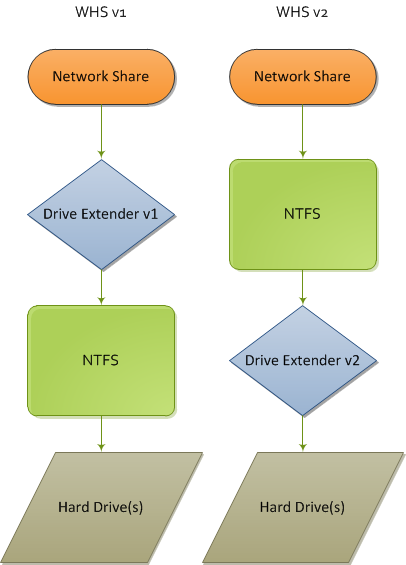Silent_Buddha
Legend
WHS v2 is going to be 64 bit only. 
http://mswhs.com/2010/04/26/windows-home-server-v2-vail-part-1/
While it's a very specialized operating system with a narrow design focus, it's still nice to see that at least one of MS' OSes will be 64 bit only.
Hopefully, that'll speed up the move to 64 bit only OS in the future, if only by a little.
Also, interesting read on the new hardware abstraction layer for HDDs in Vail.
http://www.anandtech.com/show/3677/windows-home-server-v2-vail-beta-drive-extender-v2-dissected
One thing to note, the Anandtech article isn't quite right. There isn't a hard limit to the amount of drives. But there is a bug with the new system if you have greater than 16 drivers or greater than 16 TB of data. Thus the guidance of limiting your system to 10 drives for the BETA. The WHS team are hoping to fix the bug before it's set to RTM.
I love the current implementation in WHS, even with the caveates of situations where it isn't appropriate. And the situations where you have to wait before being able to do something with a file.
Vail appears set to remove those few limitations. And could be a stepping stone towards a revamped system for future versions of Windows.
I'd love to see a WHS style drive pool seemlessly integrated into regular Windows. Since using WHS, I haven't even glanced at RAID (which I only use for data redundancy). File duplication by folder without having to set an arbitrary size (Raid 1 for example) is very nice.
Likewise, having a storage pool that automatically spans across multiple drives and can automatically include added drives or automatically adjust to removed drives is nice.
Regards,
SB
http://mswhs.com/2010/04/26/windows-home-server-v2-vail-part-1/
While it's a very specialized operating system with a narrow design focus, it's still nice to see that at least one of MS' OSes will be 64 bit only.
Hopefully, that'll speed up the move to 64 bit only OS in the future, if only by a little.
Also, interesting read on the new hardware abstraction layer for HDDs in Vail.
http://www.anandtech.com/show/3677/windows-home-server-v2-vail-beta-drive-extender-v2-dissected
One thing to note, the Anandtech article isn't quite right. There isn't a hard limit to the amount of drives. But there is a bug with the new system if you have greater than 16 drivers or greater than 16 TB of data. Thus the guidance of limiting your system to 10 drives for the BETA. The WHS team are hoping to fix the bug before it's set to RTM.
I love the current implementation in WHS, even with the caveates of situations where it isn't appropriate. And the situations where you have to wait before being able to do something with a file.
Vail appears set to remove those few limitations. And could be a stepping stone towards a revamped system for future versions of Windows.
I'd love to see a WHS style drive pool seemlessly integrated into regular Windows. Since using WHS, I haven't even glanced at RAID (which I only use for data redundancy). File duplication by folder without having to set an arbitrary size (Raid 1 for example) is very nice.
Likewise, having a storage pool that automatically spans across multiple drives and can automatically include added drives or automatically adjust to removed drives is nice.
Regards,
SB

